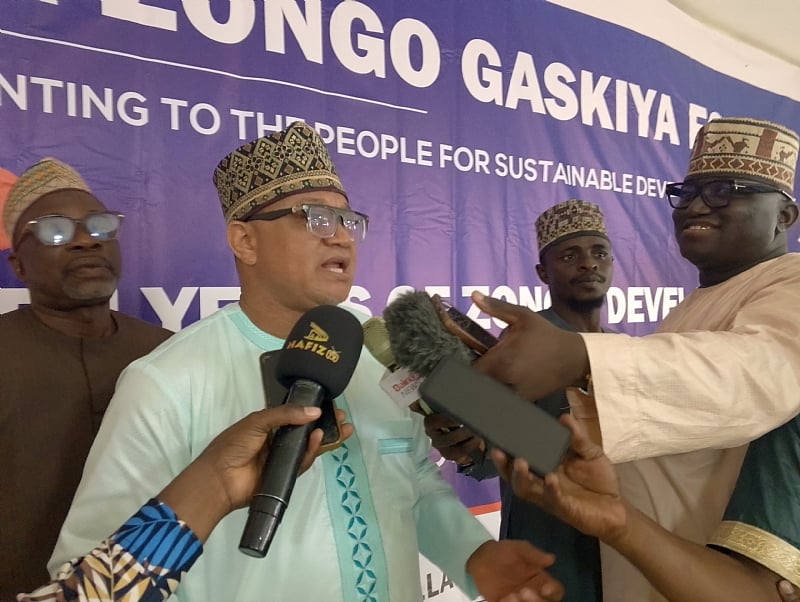The “Zongo Gaskiya Forum,” initiated by the Bawumia for President 2024 Zongo Campaign Team, aims to engage Ghanaians, particularly within Zongo communities, about the New Patriotic Party’s (NPP) performance regarding Zongo development. The forum serves as a platform to account for the NPP’s stewardship while also outlining plans for future governance under Dr. Mahamudu Bawumia, should he assume presidency in January 2025. Through this initiative, the campaign team aims to foster open dialogues with Zongo stakeholders, showcasing the tangible achievements registered by the NPP during the Fourth Republic, particularly under the administrations of former Presidents John Agyekum Kufuor and Nana Addo Dankwa Akufo-Addo. They also seek to examine the historical context of Zongo development and offer a comparative analysis with the support the National Democratic Congress (NDC) has garnered from the community over time.
At the launch, Hon. Ben Abdullah Banda, Chairman of the National Zongo Campaign Team, articulated the NPP’s milestones under the leadership of Vice President Bawumia, highlighting the party’s commitment to enhancing Ghana’s diversity and building a more inclusive society. He noted the NPP’s longstanding agenda of promoting unity, emphasizing the blend of northern and southern Ghanaian representation and the Christian-Muslim synergy within the party’s leadership. Banda pointed out the party’s historical inclusivity, recalling instances of notable nominations from diverse backgrounds, walking through nominations like that of Talon Naa Alhaji Yakubu Al Hassan Tale in the 1979 elections and the significant support for Muslim candidates, culminating in Bawumia’s landmark candidacy as the first Muslim flagbearer from a leading political party.
Banda underscored a persistent neglect of Zongo communities and inner cities by successive governments, particularly regarding sustainable development efforts since Ghana’s independence. He reflected on the governance landscape of the Fourth Republic, dominated by the NPP and NDC across five presidential terms. Despite the unwavering loyalty of the Zongo people toward the NDC, which has resulted in the election of three of its presidents, he questioned the tangible benefits of such support, suggesting that it has not translated into meaningful or deliberate development for these communities. The apparent lack of focus from the NDC has been a significant point of contention for Banda, who advocates for a re-evaluation of the political dynamics affecting Zongo areas.
The forum is structured not only to recollect past achievements but also to plot a roadmap for future engagements and developments in Zongo regions under a future NPP government. The campaign team aims to bridge the gap between political discourse and community sentiments, advocating for a model of governance characterized by responsiveness to the unique needs of Zongo dwellers. Furthermore, the Gaskiya Forum allows for collective reflection regarding the socio-economic challenges facing these communities and seeks to generate innovative solutions that empower residents to uplift their circumstances.
The inclusive nature of the forum is pivotal in setting the tone for future engagements between the NPP and Zongo constituents, emphasizing respect, accountability, and accessibility. Banda’s retrospective examination of historical patterns of political representation further enhances the NPP’s narrative of inclusivity, positioning Bawumia’s candidacy as reflective of Ghana’s rich cultural mosaic. As candidates prepare for the upcoming elections, the Zongo Gaskiya Forum stands as a critical platform for articulating a vision steeped in advocacy for marginalized communities, leveraging the achievements of the past while confronting contemporary challenges.
In conclusion, the “Zongo Gaskiya Forum” is not merely a campaign strategy but represents a deeper commitment to connecting with Zongo constituents, reflecting on past government performance, and embracing an inclusive governance model. By addressing historical neglect and repositioning the NPP as a viable alternative to the NDC’s perceived shortcomings, the initiative seeks to galvanize support around a vision for progressive Zongo development. The conversation surrounding ethnic representation, sustainable policies, and community engagement will continue to shape the political landscape, with the hope that the voices from the Zongo communities will resonate strongly in deciding the future direction of Ghana’s governance.


